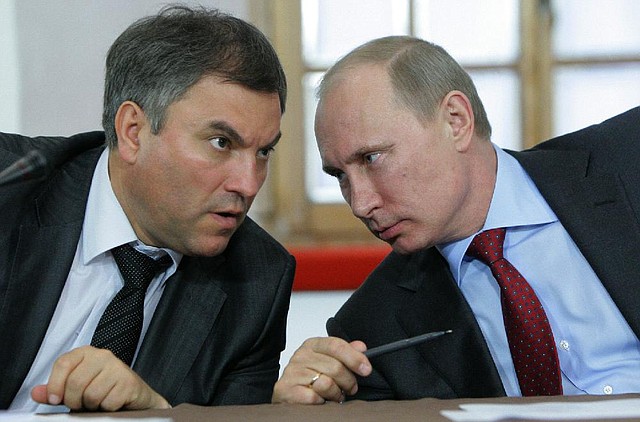More U.S. sanctions bite Russia
Travel and export bans, asset freezes target insiders, firms
FILE - In this Monday, May 23, 2011 file photo, then, Russian Prime Minister Vladimir Putin, right, speaks with his then Chief of Staff ,Vyacheslav Volodin, during a meeting of officials in Pskov, about 600 km (375 miles) northwest of Moscow. The U.S. Department of the Treasury on Monday, April 28, 2014, designated seven Russian government officials, including two key members of the Russian leaderships inner circle, and 17 entities pursuant to Executive Order (E.O.) 13661. E.O. 13661 authorizes sanctions on, among others, officials of the Russian Government and any individual or entity that is owned or controlled by, that has acted for or on behalf of, or that has provided material or other support to, a senior Russian government official. Volodin is on the list. (AP Photo/RIA Novosti, Alexei Nikolsky, Pool, File)
Tuesday, April 29, 2014
WASHINGTON - The United States on Monday imposed additional sanctions against Russian government officials and companies deemed close to President Vladimir Putin, accusing Moscow of failing to live up to its agreement to defuse the crisis in Ukraine.
The Obama administration ordered travel bans and asset freezes for seven Russian officials, including two said to be in Putin’s inner circle, and froze assets for 17 companies. Thirteen Russian companies will also face additional restrictions, as the U.S. government will cut off the export or re-export of U.S.-made products to them.
Additionally, the State and Commerce departments announced a new policy to deny export license applications for high-technology items that could contribute to Russia’s military capabilities. The two departments will revoke existing export licenses along those lines, a White House statement read.
In Brussels, the European Union moved to add 15 more officials to its Russian sanctions list to protest Moscow’s meddling in Ukraine. That decision, reached by the ambassadors to the EU’s 28 nations, was being formally confirmed by the EU’s governments, officials said.
Among those targeted Monday by the U.S. was Igor Sechin, president of the state-owned Rosneft oil company and a longtime Putin adviser. Although administration officials said over the weekend that they also expected Alexei Miller, the head of the energy giant Gazprom, to possibly be targeted, President Barack Obama ultimately chose a list that did not include him.
Others who face sanctions include Dmitry Kozak, a deputy prime minister; Vyacheslav Volodin, a deputy chief of staff to Putin; and Alexei Pushkov, the chairman of the international affairs committee of the State Duma, the lower house of Parliament.
The companies targeted included several banks, including Sobinbank, and energy companies such as the Stroytransgaz Group and various related entities.
The firms targeted Monday were all tied to Russian businessmen who were targeted in previous rounds of sanctions.
“Today’s targeted sanctions, taken in close coordination with the EU, will increase the impact we have already begun to see on Russia’s own economy as a result of Russia’s actions in Ukraine and from U.S. and international sanctions,” Jacob Lew, the Treasury secretary, said in a statement. “Russian economic growth forecasts have dropped sharply, capital flight has accelerated and higher borrowing costs reflect declining confidence in the market outlook.”
Other individuals subject to the travel ban and asset freeze were Oleg Belavantsev, who was appointed by Putin last month as presidential envoy overseeing the annexed Crimean Peninsula; Sergei Chemezov, the director general of Rostec, the Russian state firm overseeing high-technology industries and a longtime member of Putin’s circle; and Evgeny Murov, the director of Russia’s Federal Protective Service and an army general.
Also on Monday, the mayor of Ukraine’s second-largest city was shot in the back, and hundreds of men attacked a peaceful pro-Ukraine rally with batons, bricks and stun grenades, wounding dozens as tensions soared in Ukraine’s volatile east.
Hennady Kernes, the mayor of Kharkiv, was shot in the back Monday morning while cycling on the outskirts of the city, his office said. He underwent surgery and was reported by the hospital to be in “grave but stable” condition.
Kernes’ friend and former Kharkiv province governor,Mykhailo Dobkin, said the attackers had aimed at Kernes’ heart and wanted to kill him to destabilize the city.
“If you want to know my opinion, they were shooting not at Kernes but at Kharkiv,” he said. Dobkin is among several candidates running in Ukraine’s May 25 presidential election, which the interim government says Russia is trying to derail.
In the eastern city of Donetsk, about 1,000 demonstrators carrying Ukrainian flags marched through the streets to hold a pro-Ukrainian rally Monday night.
They were attacked by several hundred armed men shouting “Russia!”
Police attempted to hold the pro-Russia men back but then largely stood aside as dozens of protesters were battered.
Elsewhere in the east, pro-Russia militants wearing masks gained another foothold, seizing a city hall building and police station in the city of Kostyantynivka, 100 miles from the Russian border.
The city is 22 miles south of Slovyansk, a major city that has been in the hands of insurgents for more than three weeks.
Information for this article was contributed by Mark Landler, Peter Baker, Neil MacFarquhar and Andrew E. Kramer of The New York Times and by Maria Danilova, Nataliya Vasilyeva, Laura Mills, Efrem Lukatsky, Sergei Grits, Julia Gronnevet and Julie Pace of The Associated Press.
Front Section, Pages 2 on 04/29/2014

